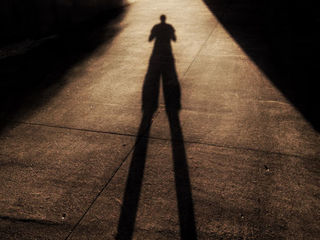We hear the terms shadow and consciousness thrown about quite a bit these days, with a lot of misunderstanding, not only about the concepts themselves, but about what we are to do with these concepts. So, let’s start first by giving a working definition of each.
The shadow, a term originally coined by Carl Jung, is the unconscious. It is all of those things we don’t know about ourselves. So, I frequently ask my clients what they are feeling about something, and they commonly answer, “I don’t know.” Sometimes, if I feel that we have built enough rapport, I will say, “If you don’t know what you are feeling, who is going to know?” The feeling that is unknown is unconscious—at least for the moment.
There are some people, particularly teachers of the New Age, New Thought or Human Potential movements, who are teaching that the shadow is the dark side or the evil side of human consciousness. And while the shadow may contain some of our darker motivations, it is not, in and of itself, “bad” in any form. It is simply unconscious. While it is true that we can be motivated to do harm to self or other out of unconscious impulses, that does not mean that the whole of the shadow is bad. One of the things that is also, commonly found in the unconscious is the authentic self. It has been sent away from consciousness in order that we may don a mask and costume with which we wholly identify. This mask and costume becomes how we see ourselves, it becomes our identity—rather than seeing ourselves as the authentic self we actually are. So, the shadow cannot be qualified as either good or bad. It is neutral in value, but it contains some things that we need if we are going to live as whole people.
Consciousness then is everything about which we are conscious. It is what we think that we know to be true about ourselves. Very commonly, however, what we think we know is not necessarily true about the authentic self. We may, for example, think that we are very selfless, giving people. But hidden in the unconscious and only made aware to us when we are really tired, is a load of resentment that comes from serving others out of obligation and guilt instead of out of true compassion and passion. So this means that consciousness is not necessarily good—it’s just what we think is true about ourselves. Nor, as we can see, is consciousness necessarily right. That of which we are aware might only be the thinnest veneer of a persona. It might be the shallowest end of the pool that we call self.

So, now we have consciousness and unconsciousness. Is it just meant to stay that way? Are we just meant to live a half-life of consciousness that may not be true at all or, perhaps, is only partially true? Many do live just that way for entire lifetimes.
Or, is it possible to work with shadow material in such a way that we bring it out into conscious awareness, and thereby become more whole persons. The thing is that most of us are afraid of what we will find in the unconscious—mostly because we secretly know that we have deposited some unwanted material there. We had, for example, “bad” thoughts about others that we quickly sent to the unconscious so that we would not know that we had them. Then we could easily say that we never had those “bad” thoughts, and therefore, we are good people. Those thoughts, and the feelings that go with them, however, might be very important for us to look at, for they might guide us into living more genuinely.
So, in the case above, in which a person has sent a load of resentment to the unconscious, while they live out an identity as a selfless servant of others—what could unburying that resentment do—besides make us feel guilty? Unburying that resentment could inform us that we are doing a lot of things we don’t really desire to do, things that do not come from genuine compassion and/or passion, but rather come from fear of feeling guilty, or a sense of obligation. That resentment then, knows the truth. It knows that we are living a lie. It knows that we are not being genuine. It knows that we only trust obligation to make us feel good. It knows that we are not living sincerely or genuinely from the authentic self. So, that resentment points the way to a more authentic life.
The shadow does know. It knows the truth, and allowing ourselves to do the work of uncovering shadow material is very important to living a fulfilling life. How do we do that work? In the next blog post we will talk about how to do shadow work.


